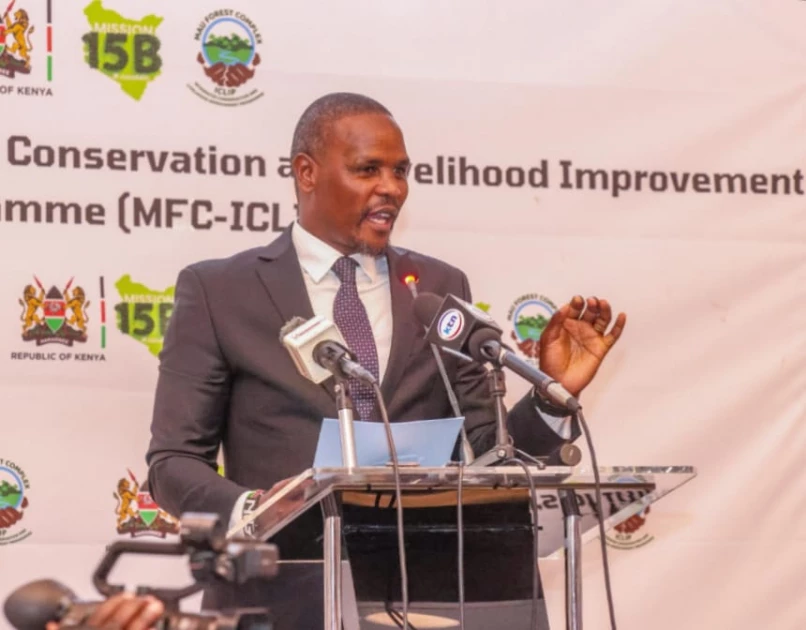Gov't unveils Ksh.21.5 billion 10-year plan to restore Mau Forest complex

Principal Secretary (PS) for Environment and Climate Change Festus Ng’eno.

Audio By Vocalize
The Kenyan government’s 10-year plan to fully
restore the Mau Forest Complex banks on partners for a breakthrough.
The Mau Forest
Complex (MFC) holds the highest economic value among Kenya’s forests, estimated
at KES 197 billion, attributed to its extensive resources and transboundary
ecosystem services.
In the past,
the MFC has faced numerous challenges as a result of human activities and
changing climatic conditions.
Human actions
that have disrupted the Mau ecosystem include illegal charcoal production,
unsustainable timber harvesting, overgrazing, forest fires, land use changes,
poor agricultural practices, and encroachment on riparian zones, among other
challenges destroying nature.
Despite the
past harm caused to the Mau, there is hope for the younger generation and those
to come. The Kenyan government, through the Ministry of Environment and Climate
Change under the leadership of Principal Secretary Festus Ng’eno, has announced a KES 21.5
billion 10-year program to restore the Mau Complex into its pristine state,
while considering humane aspects.
Addressing
restoration partners, including state departments working closely with the
ministry, during a meeting at a Nairobi hotel, the Principal Secretary (PS)
said that the government does not have a budgetary allocation to achieve the
restoration plan and is instead relying on partners of goodwill, including
individuals, to support the ambitious initiative.
“I am the
accounting officer for the State Department of Environment and Climate Change.
I wish to remind you that the government does not have an allocation towards
this project. I am entirely looking up to you to make it happen,” said PS
Ng’eno.
The
restoration project, dubbed Mau Forest Complex Integrated Conservation and
Livelihood Improvement Programme (MFC-ICLIP), will launch on
October 24, 2025. It aims to restore 3,313 hectares of degraded forest with
approximately 4,000,000 tree seedlings during the first edition at the launch.
To kickstart the vision, the ministry initiated a weekly tree-planting drive
four weeks ago, which has so far planted over 150,000 seedlings in the Eastern
Mau.
Over 10
years, the project targets restoring a total of 33,138 hectares of forest and
668 hectares of wetlands, as well as fencing 300 km of forest boundaries.
The MFC is
the source of 12 major rivers – including the Nzoia, Yala, Nyando, Sondu-Miriu,
and Mara rivers, which drain into Lake Victoria; the Ewaso Ng’iro River,
draining into Lake Natron in Northern Tanzania; the Njoro, Makalia, Naishi, and
Nderit rivers, which feed Lake Nakuru and Lake Naivasha; the Molo River, draining
into Lake Baringo; and the Kerio River, draining into Lake Turkana.
The Mau
Forest Complex covers approximately 403,000 hectares. It is the largest
afro-montane forest in East Africa and Kenya’s most important water tower,
consisting of 22 forest blocks: 21 public forests managed by the Kenya Forest
Service and one community-managed block, the Maasai Mau.


Leave a Comment